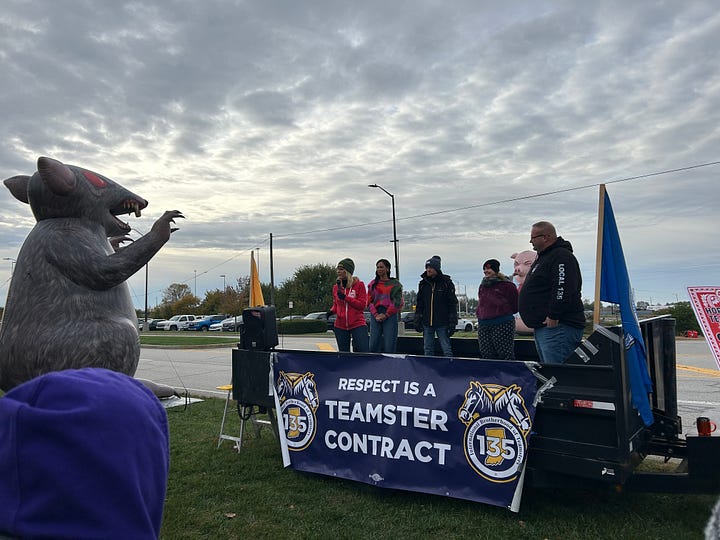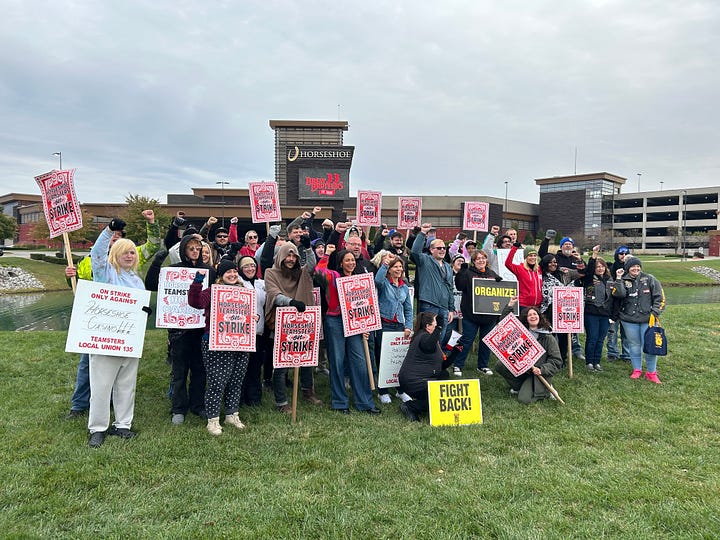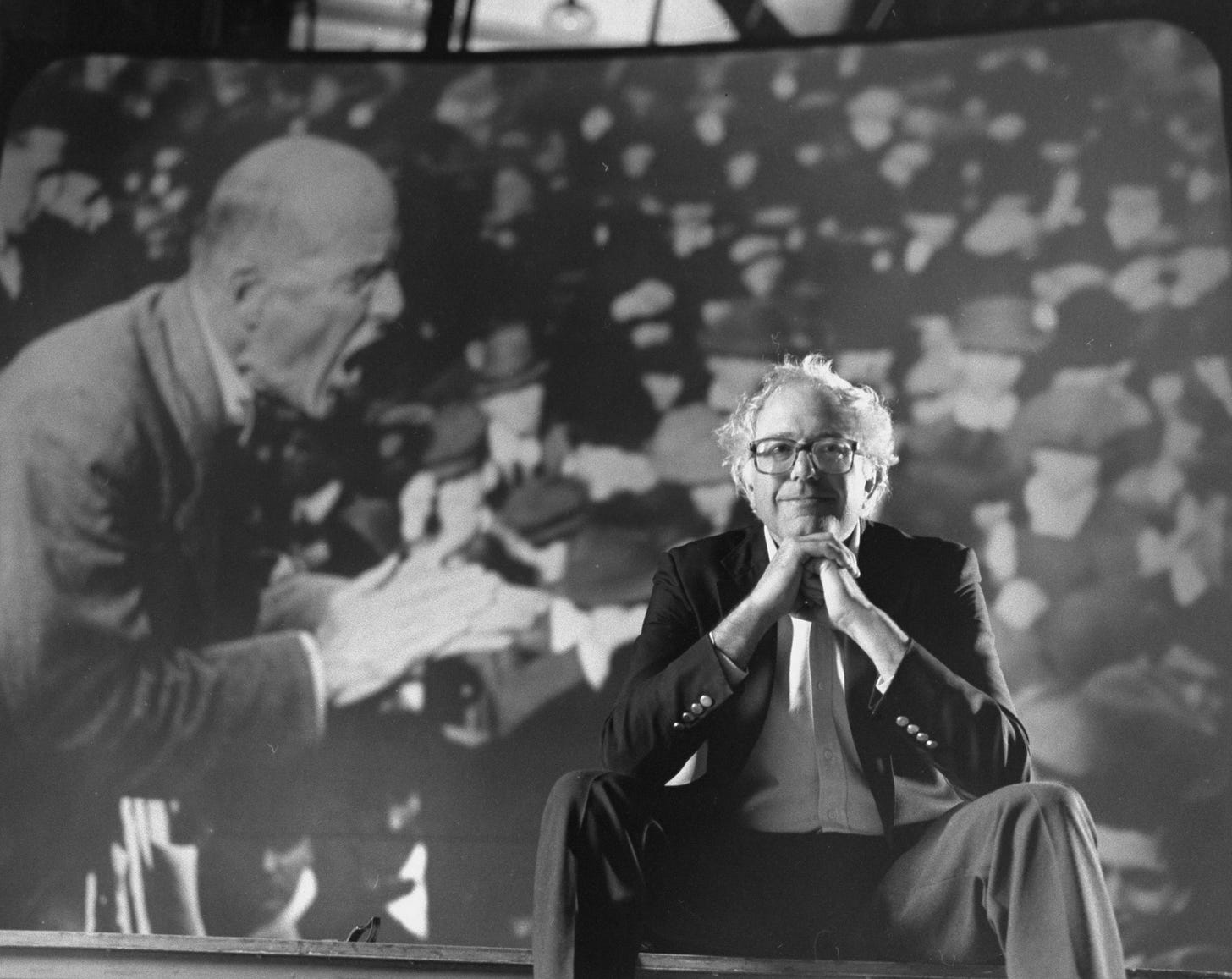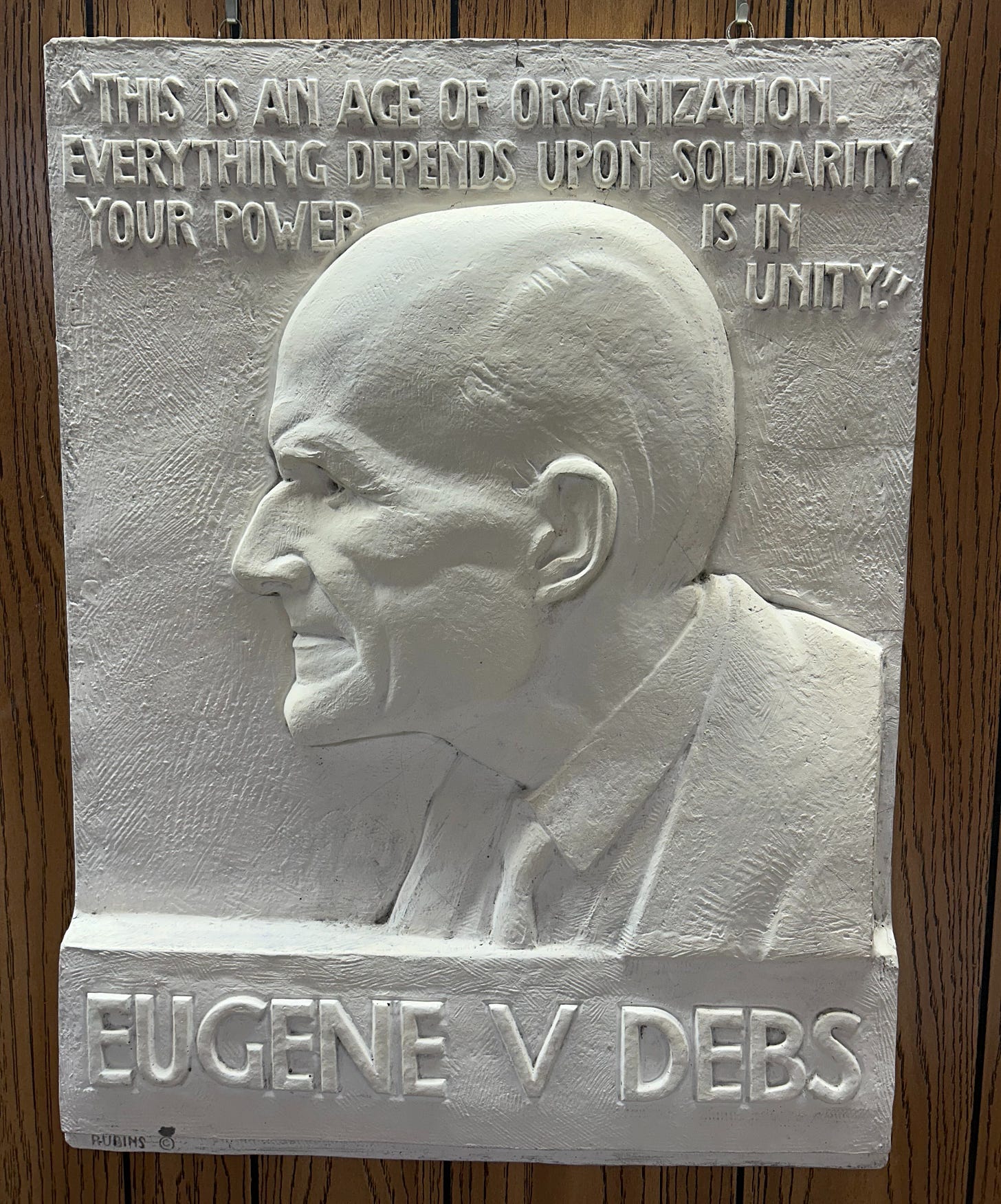Eugene Debs and All Of Us
In Terre Haute with the keepers of the flame.
On Saturday night, I witnessed a ballroom full of stout Midwesterners—railroad men and laborers, college professors and students, retirees and young parents—stand and say, in unison, “While there is a lower class, I am in it; while there is a criminal element, I am of it; and while there is a soul in prison, I am not free.” There, in the salt-of-the-earth town of Terre Haute, Indiana, I saw the line of solidarity that runs from America’s deep past into its future. It’s still running. Have no fear.
Ever since the enlightenment, people disillusioned with religion are always bemoaning the fact that there does not seem to be anything quite adequate to replace its cultural role. Well, why not Debs? Why not replace it with the collective veneration of Eugene V. Debs, the famed American union leader, socialist, and rabble rouser? It could work. The man was a prolific writer, and turned a phrase at least as well as the guys who wrote the Bible. Debs was born and raised in Terre Haute, and his home there is now a museum. (He is the town’s second-biggest claim to fame, after the fact that it was where Larry Bird played his college ball.) For the past 60 years, the Debs Foundation has put on an annual banquet to honor some individual of the left who carries on the great man’s legacy. This year, the honoree was Bernie Sanders. The stakes felt a little higher. The moment felt more urgent. If ever there was a time to bring back all-American prairie socialism, it is now.
Debs, who lived from 1855 to 1926, rose Straight Outta Terre Haute to organize railroad workers, lead the huge but unsuccessful Pullman Strike of 1894, and run for president four times on the Socialist Party ticket—the last time, while he was in prison for antiwar activism. He is a good intellectual anchor if you want to reflect on how warped, unrealistic, and stupid today’s image of unshakable “red” and “blue” states is. Another good way to understand this is to go to a picket line in Indiana. That is what I did on Saturday morning. At the enormous Horseshoe Casino just outside Indianapolis, 200 dealers and other workers have been on strike for more than a week. They are trying to join the Teamsters, and Caesars, the company that owns the casino, is stalling and denying them the right to vote for their union and blaming the government shutdown. Therefore they are striking for recognition. They are regular Indiana working people, and they are badass.
Early Saturday morning, there was an inflatable rat on one side of the road leading into the casino and an inflatable Greedy CEO Pig on the other side. The Teamsters pulled a flatbed trailer next to the rat and all the workers with picket signs crowded around for exhortations. A handful came up to say why they were there. “Our voices matter. We don’t want no pizza party,” said a dealer named Zach. “We want respect, dignity, and a voice.”
His coworker Jade, a dealer at the casino for the past four years, drove the point home. “This is a trade,” she said. It was a trade that required years of practice to perfect, and those who learned the trade should be treated as the skilled workers that they are. She spoke of how the company said she was good at her job, and asked her to train others, as if that was enough. “I like my compliments in the form of compensation,” she said, to applause.
Sara Nelson, the president of the Association of Flight Attendants, was last year’s winner of the Debs Award. She stopped by the picket line on her way to Terre Haute, toting five dozen donuts. Nelson took the microphone and delivered a stemwinder to the shivering workers. She quoted Mother Jones: “Workers built the palaces and generated all the wealth in this country, but neither dwell in those palaces, nor spend that wealth.” She spoke about her friends dying on 9/11, and how “crisis capitalists” used the tragedy as an opportunity to try to rob workers of their pensions. And she spoke about what all of us standing by the side of that road have in common.


“Caesars doesn’t work without you. Airplanes don’t fly without us. And the issues that we face as working people are the same. They’ve stolen our money, and they’ve stolen our time, and it’s about time we start acting like the workers who didn’t have labor law!” she hollered. “We’ve been sold a bill of goods in this country that we’re divided. We’re divided by gender, we’re divided by race, we’re divided by who we love, we’re divided by where we worship or whether we worship at all. And now they’re trying to tell us that we’re divided by Democrats, Republicans, and Independents. Let me tell you something: I don’t give a fuck about politics! We’re workers. When we act together, the politics come to us.”
Afterwards, one of the striking women bundled in a flannel shirt as the wind whipped by noted wryly that Indiana’s official slogan is “The state that works.”
“But who do they work for?” she asked.
Eugene Debs’ house is a gracious white Victorian on a corner that now abuts the campus of Indiana State University. It was rescued from its role as a frat house in the 1960s and restored. The attic upstairs has been covered in historic murals: Debs on trial, Debs in prison, Debs exhorting the workers of the world, workers marching on the picket line. After a quick tour we all filed across the street to the university library, where Nelson and Mark Dimondstein, the head of the American Postal Workers Union, did a panel discussion about class war. Dimondstein, one of the more outspoken progressive union leaders in the AFL-CIO, wrapped up his remarks with a quote from the Canadian political leader Tommy Douglas: “Courage, my friend. ‘Tis not too late to build a better world.” When the panel ended, Nelson and Dimondstein were whisked back to the house for a private tour alongside Alexandria Ocasio-Cortez, who had come to introduce Bernie at the dinner. Sanders himself, I heard, got a tour of the house all by himself, so that he could best commune with the spirit of Debs uninterrupted.
That night, the Terre Haute Convention Center was transformed into a ballroom. There were metal detectors and state police and an unusual level of security, thanks mostly to the presence of AOC, who now lives in a sea of death threats. On stage was a fair representation of today’s inheritors of Debs’ legacy: Nelson and Dimondstein, representing the labor left, and Bernie and AOC, representing the political left. Outside, beyond Terre Haute, lurked the crisis capitalists and the fascists and the monopolists and the militarists and the corporations and the cops. As then, as now. Debs might be disappointed that the struggle has not been won, but he would appreciate the fact that the struggle is still being carried on.
AOC paid tribute to Bernie himself as the inspiration for her own political awakening, and that of many people like her. It was a nice speech, which caused Bernie, allergic to compliments, to grimace and grin at the same time. When Bernie finally began to speak, it was clear that he was at home; he himself had made a video celebrating Debs in the 1970s, and his role as America’s foremost dogged spokesman for socialism makes him the direct descendant of Debs, though many of his younger fans today may not know that.
Bernie credited Debs with helping to inspire the progressive agenda that FDR would later make a reality, and which set the tone for the shared prosperity of the mid-20th century. Looking backwards from today, it is impossible not to be struck by the fact that we seem to have completed an entire political cycle since the time of Debs. Now, we are back to re-fighting the same battles that he tried, and failed, to win at the turn of the last century.
“Let me just take a moment to review some of the remarkable insights that Debs had over 100 years ago—insights which are absolutely as relevant today as they were when he was alive. Here’s what Eugene Victor Debs said: ‘I am opposing a social order in which it is possible for one man who does absolutely nothing that is useful to amass a fortune of hundreds of millions of dollars, while millions of men and women who work all the days of their lives secure barely enough for a wretched existence.’ Debs said that over 100 years ago,” Sanders thundered. “And the only thing that has changed is that instead of people on the top being worth hundreds of millions, they’re now worth hundreds of billions.”
“And then Debs said this. He said, ‘In every age, it has been the tyrant, the oppressor, and the exploiter who has wrapped himself in the cloak of patriotism or religion or both to deceive and overawe the people.’ Under Donald Trump we have an ‘America First’ that gives a trillion dollars in tax breaks to the one percent. Which denies trying to throw 15 million people off the healthcare they have, trying to double the premiums you are paying in the Affordable Care Act. But we’re not supposed to deal with that. We’re supposed to worry about the undocumented people in this country—the vast majority of them work day and night trying to feed their families,” Sanders said. “Same business. Wrap yourself around the flag, exploit working people, and give tax breaks to the billionaires.”
“Bullshit!” yelled someone in the audience. Bernie paused and smiled.
“That is a succinct description.”
Idealism has the power to transcend personality. The reason why Bernie Sanders, a grouchy old man, is capable of being the most famous totem of socialism, a deeply humanistic belief system, is that the beliefs themselves carry a love that can be neither faked by pretenders nor squashed by grouchiness. “What Debs was talking about,” Bernie said correctly, “was the whole concept of human solidarity. Not only trade union solidarity, but human solidarity.”
Only six percent of private sector workers in America are union members today. Union solidarity is not gonna get the job done. Human solidarity, yes. That is the only thing left. At the end of the ceremony, Sara Nelson led the crowd in “Solidarity Forever.” Bernie, singing along on the dais, knew all the words.
They have taken untold millions
That they never toiled to earn
But without our brain and muscle
Not a single wheel would turn
Bernie and AOC would leave Indiana and head to New York, where they headlined a rally last night with Zohran Mamdani, the young socialist who is about to be elected mayor of America’s biggest city. In 1918, Eugene Debs told a judge, “I could have been in Congress long ago. I have preferred to go to prison.” And to prison he went. His body now lies in a grave in Highland Lawn Cemetery in Terre Haute. But his example lives, still, for all of us to see. If the fight gets hard, it is worth remembering that it was hard back then, too. Time goes on and so do we.
More
Related reading: The Hammer, Not the Handshake; They Are Going to Take Everything If We Don’t Stop Them; A Television Show Called the USA. To learn more about Eugene Debs, or to donate to the museum or buy from its gift shop, visit the website of the Debs Foundation.
For those of you in DC, I will be speaking about my book and the labor movement at Georgetown University tonight at 5:30 pm. The event is free and open to the public. Full info is here.
Thank you for reading How Things Work. Reading and writing are, in their own way, acts of human solidarity, as well. I have the opportunity to do things like go to Terre Haute and write about Bernie’s speech only thanks to the financial support of readers of this publication. If you want to help support this place—and help to keep it paywall-free, so that anyone can read it regardless of income—please take a second right now to click the link below and become a paid subscriber. It’s affordable and it is a nice thing to do for independent media. Keep on coming back, my friends.




I drove out to the Debs Dinner with a DSA comrade who's also probably the first open socialist elected to office in Indiana since the time of Debs.
As we drove home, I turned to him and said that this was sort of an epic moment, I wonder whether there will be a story about in on the nightly news or pape back in Indy. There wasn't.
Thank you for writing this story. Thank you for keeping the fire alive.
Great article! Thank you so much! Uplifting and inspiring!